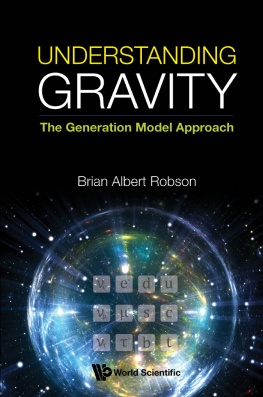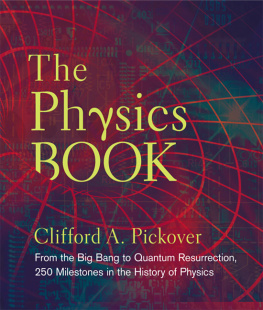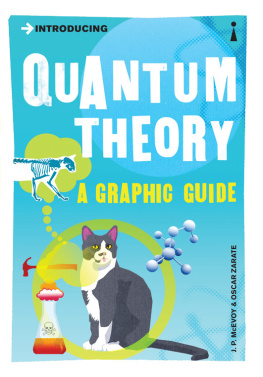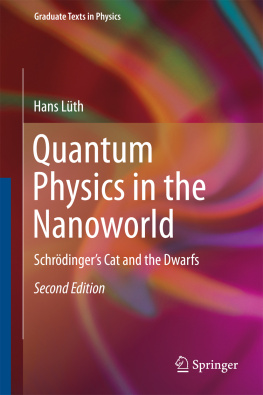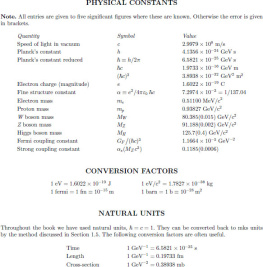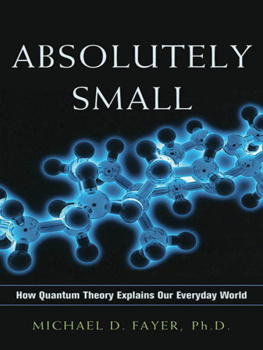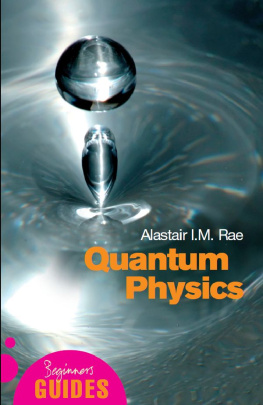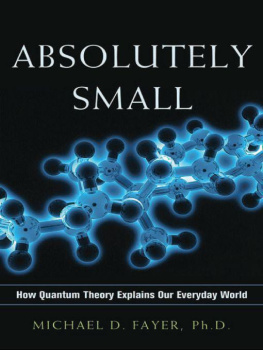Tim James - How Quantum and Particle Physics Explain Absolutely Everything
Here you can read online Tim James - How Quantum and Particle Physics Explain Absolutely Everything full text of the book (entire story) in english for free. Download pdf and epub, get meaning, cover and reviews about this ebook. year: 2020, publisher: Pegasus Books;b, genre: Children. Description of the work, (preface) as well as reviews are available. Best literature library LitArk.com created for fans of good reading and offers a wide selection of genres:
Romance novel
Science fiction
Adventure
Detective
Science
History
Home and family
Prose
Art
Politics
Computer
Non-fiction
Religion
Business
Children
Humor
Choose a favorite category and find really read worthwhile books. Enjoy immersion in the world of imagination, feel the emotions of the characters or learn something new for yourself, make an fascinating discovery.

How Quantum and Particle Physics Explain Absolutely Everything: summary, description and annotation
We offer to read an annotation, description, summary or preface (depends on what the author of the book "How Quantum and Particle Physics Explain Absolutely Everything" wrote himself). If you haven't found the necessary information about the book — write in the comments, we will try to find it.
Tim James: author's other books
Who wrote How Quantum and Particle Physics Explain Absolutely Everything? Find out the surname, the name of the author of the book and a list of all author's works by series.
How Quantum and Particle Physics Explain Absolutely Everything — read online for free the complete book (whole text) full work
Below is the text of the book, divided by pages. System saving the place of the last page read, allows you to conveniently read the book "How Quantum and Particle Physics Explain Absolutely Everything" online for free, without having to search again every time where you left off. Put a bookmark, and you can go to the page where you finished reading at any time.
Font size:
Interval:
Bookmark:
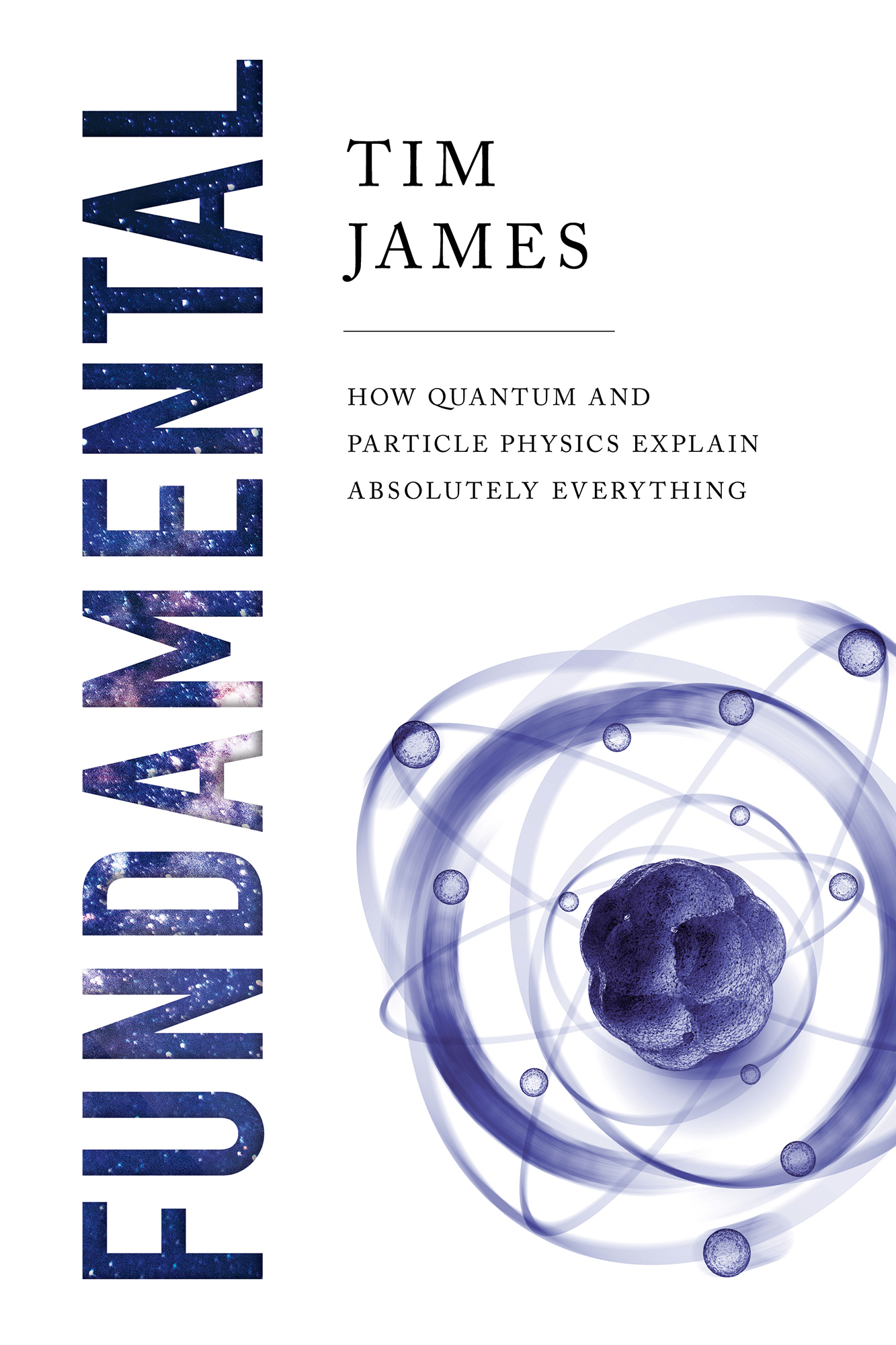

F UNDAMENTAL
Pegasus Books, Ltd.
West 37th Street, 13th Floor
New York, NY 10018
Copyright 2020 by Tim James
First Pegasus Books hardcover edition July 2020
All rights reserved. No part of this book may be reproduced in whole or in part without written permission from the publisher, except by reviewers who may quote brief excerpts in connection with a review in a newspaper, magazine, or electronic publication; nor may any part of this book be reproduced, stored in a retrieval system, or transmitted in any form or by any means electronic, mechanical, photocopying, recording, or other, without written permission from the publisher.
Jacket Credit: Faceout Studio, Molly von Borstel
Art Credit: Shutterstock
ISBN: 978-1-64313-470-3
ISBN: 978-1-64313-471-0 (eBook)
Distributed by Simon & Schuster
Dedicated to the students of Northgate High School
No matter how sure scientists think they are, nature has a way of surprising them.
Nemesis by Isaac Asimov

Nature is out of her mind. When you get right down to the fundamental laws of physics, right down to the basement, you find yourself in a realm of craziness and chaos where knowledge and imagination become the same thing.
This should not come as a surprise of course you have to question the sanity of a universe which permits the existence of starfish but even if you are prepared for nature to be eccentric, nothing braces you for quantum physics.
It began at the end of the nineteenth century when everyone was feeling smug about themselves. We had mapped the stars, isolated DNA and were on the verge of splitting the atom. Our knowledge was nearly complete and it looked as though we were about to witness the grand finale of human achievement: the end of science itself.
There were obviously a few awkward scientific puzzles nobody had quite solved but they were minor curiosities dangling to one side, like loose threads hanging off a tapestry. It was only when we gave these threads a tug that the whole picture we had been weaving for centuries began to unravel and we were brought face to face with a new picture of reality. A quantum one.
The Nobel Laureate Richard Feynman once opened a series of lectures on quantum physics by saying: My physics students do not understand it. I do not understand it. Nobody does. These are sobering words to hear from arguably the greatest quantum physicist in history. After all, if someone as brilliant as Feynman could not fold his brain around the topic, what chance do the rest of us mortals have?
What has to be appreciated, however, is that Feynman was not saying quantum physics is too complicated to understand. He was saying quantum physics is too darn strange.
Suppose someone told you to picture a four-sided triangle, or to think of a number that is smaller than ten but bigger than a billion. Those instructions are not complicated but you could not easily follow them because they are nonsensical. This is what our journey into quantum physics is going to look like.
It is a world of four-sided triangles and numbers that do not follow ordinary rules; a place where parallel universes and paradoxes lurk around every corner and objects do not have to pay attention to space or time.
Unfortunately our brains are not built to handle this kind of madness and the words we have at our disposal are not weird enough to capture nature as she truly is. That is why the physicist Niels Bohr said that when it came to quantum physics language can be used only as poetry.
The mistake a lot of people make is to find the whole thing baffling and decide they are not clever enough to grasp it. Do not be troubled though. Frankly, if you find this subject bizarre and unsettling that puts you alongside the greatest minds in history.

Quantum physics began with trying to understand light, something we have been scratching our collective heads over for millennia. The Greek philosopher Empedocles, some time around the fifth century BCE , was the first person to theorise what light is.
He believed the human eye contained a magical fire-stone, which shone rays outward from our faces, illuminating whatever we wanted to look at. A poetic idea, but with an obvious flaw: if our eyes are generating the light we should always be able to see in the dark because our eyes themselves are torches.
Empedocles was also the guy who gave us the now debunked idea of four elemental substances (fire, water, wind and earth) as well as attempting to explain biological diversity as the result of bodiless limbs crawling around the world until they joined up with each other at random to form animals.
Really, Empedocless job in scientific history was to come up with bonkers ideas everyone else proved wrong. Although in the case of light rays, it took us about thirteen hundred years to realise his mistake.
It was not until the Arabic scholar Alhazen came along that we finally let go of Empedocless notion. Alhazen carried out an experiment in which he dissected a pigs eyeball and showed that light bounced around inside the cavity the same way it does in a dark room, i.e. light is coming from objects around us and our eyes just happen to intercept their paths.
It might seem weird that it took over a thousand years for us to be sure our eyes were not zapping out magical lasers, but those were different times. Back then everyone assumed humans gave objects their purpose for existing, so there was no need for them to have an appearance when they were not being looked at.
Fortunately, Alhazens suggestion that experiment should trump human ego gradually caught on and we decided that light, whatever it was, came from the objects themselves and entered our eyes in straight lines. Cue the Renaissance.
Arguably, the most influential Renaissance scientist/philosopher was Ren Descartes, who gave us our next big idea about the physics of light.
Descartes noticed that when a candle is lit, the illumination can simultaneously reach every corner of a room, the same way a ripple started in the centre of a pond can reach every edge at the same time. Light, he reasoned, was a similar phenomenon; there was an invisible material surrounding us in every direction, which he called plenum, and light was the result of ripples and waves moving through it.
The only person to disagree with his plenum-wave idea was Isaac Newton, who chiefly made it his business to disagree with anyone he considered less intelligent than himself (which was basically everyone).
Newton pointed out that if light was a wave moving through a medium it should bend around an object as it went past, the way a water wave will curve slightly as it goes around a rock. This would give shadows blurry edges, but since they are sharply defined it made more sense to think of light being made of particles, which he called corpuscles.
The corpuscular light theory was inevitably accepted over Descartess plenum waves, largely due to Newtons celebrity status and the fact that he was a bully to anyone who challenged him.
Font size:
Interval:
Bookmark:
Similar books «How Quantum and Particle Physics Explain Absolutely Everything»
Look at similar books to How Quantum and Particle Physics Explain Absolutely Everything. We have selected literature similar in name and meaning in the hope of providing readers with more options to find new, interesting, not yet read works.
Discussion, reviews of the book How Quantum and Particle Physics Explain Absolutely Everything and just readers' own opinions. Leave your comments, write what you think about the work, its meaning or the main characters. Specify what exactly you liked and what you didn't like, and why you think so.




